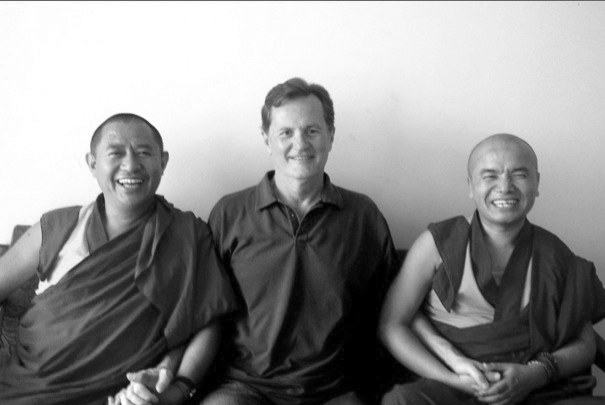Few individuals get the opportunity to travel across the globe, much less work with one of the most influential figures of our time. Philosophy and Environmental Studies Professor Deane Curtin had the chance to do both this past year when he went to work for the Dalai Lama in Tibet during his sabbatical.
Curtin illustrated his time spent in the Himalayas of northern India working with the Dalai Lama and the Tibetan refugee community in a presentation sponsored by the Department of Philosophy, the Raymond and Florence Sponberg Chair of Ethics, the Hanson-Peterson Professorship in the Liberal Arts, and the Office of the Provost on Monday, Oct. 27 titled “The Art of Happiness: A Year with the Dalai Lama.”
Curtin began the event by sharing photos and tales of his favorite moments abroad.
“I said to my friend [and former translator to the Dalai Lama], Geshe Lhakdor, ‘I’d like to come here and talk to you during my sabbatical, but I’d also like to contribute something back to Tibetan culture.’ I remember telling him it makes no difference what it is. He smiled and said he knew I was coming and that he was with His Holiness last week who said he’d like for Western philosophy to be translated into Tibetan. He looked at me and said “Would you like to be in charge of that program?” and it took a nanosecond of reflection. I said ‘I’m your guy!’” Curtin said.

Curtin then spoke of his time and contributions in the community, such as designing a course for a Tibetan university and translating works of Western philosophy, and ended with his experience meeting the Dalai Lama.
“He was keenly interested and curious in the three things I was doing. He meets people all day, yet, I’ve never seen anybody connect like he does. For example, he was very interested in what I was teaching at the Tibetan university, because I’d done it at the request of his younger sister. I was teaching his book and basically he argues that religion sometimes causes more harm than good in the world today, and what we need is a form of ethics that comes before religion based on compassion, compatible with all religions, but without politics.” Curtin said.
Throughout the talk, Curtin also spoke of the Dalai Lama’s book, The Art of Happiness, his view on how one can find true happiness within themselves.
“He thinks that we are basically beings who desire to be happy and that we’re all the same in this way. All he wants to do is meet you as a human being, not as the Dalai Lama. He says that we’re identical. We all seek the same thing: happiness and to be free of suffering. Read what he says. Listen to what he says. Dig a little deeper. Try to find out what this art of happiness really is,” Curtin said.
Curtin brings this outlook into his own courses, especially when speaking of the Dalai Lama.
“For several years, Deane has taught a course on Buddhist philosophy that has been quite popular. This semester, he is offering a special topics course, ‘Philosophy of the Dalai Lama.’ Deane is uniquely qualified to offer this course, so our students have a unique opportunity. Deane generally teaches courses that are discussion-based so that students are not just learning about philosophy; they are doing it. His courses often are writing intensive, so students have the opportunity to learn how to write philosophically from a very prolific scholar,” Philosophy and Gender, Women, and Sexuality Studies Professor Peg O’Connor said.

Senior Philosophy Major Eric Gazett is currently in Curtin’s special topics course.
“The class is very different every day. What Deane is trying to teach is that Buddhism is more of a philosophy than a religion and that compassion comes before all else,” Gazett said.
Curtin discusses how his own experience has impacted his outlook on life.
“Some people have known me here for 30 years, and they say that I’m a much happier person than I used to be. I was lucky to have the education I did, but I was not happy. In the beginning, years ago, when I first started going to Nepal and hanging out in Tibetan communities, what impressed me was that they were happy. They hold arms, they walk down the street, they laugh, and this is despite the fact that not one of them has a family intact. A lot of them have been tortured. They have had lives that are so much more difficult than ours, and, somehow, they’ve managed to be happy. I wanted to know what that was about. Really, that’s what this year was about,” Curtin said.
